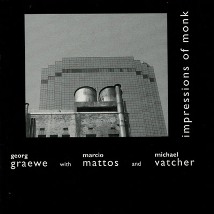©Laurence Svirchev
 There are only two ways to play the music of Thelonious Sphere Monk: the wrong way and the right way. Wrong-way musicians are generally from the Repertory School of jazz. They homogenize the music, blend the cream with the lean, and devoid it of its unique flavors and textural layers. But Monk’s compositions are sparkling jewels of perfection with concise melodies and rhythms, structural twists and turns. The musician who wishes to successfully play them has to get inside them, study the unique compositional logic, get finicky with the details, and then boldly display his own audacious imagination. There is no middle road with Monk.
There are only two ways to play the music of Thelonious Sphere Monk: the wrong way and the right way. Wrong-way musicians are generally from the Repertory School of jazz. They homogenize the music, blend the cream with the lean, and devoid it of its unique flavors and textural layers. But Monk’s compositions are sparkling jewels of perfection with concise melodies and rhythms, structural twists and turns. The musician who wishes to successfully play them has to get inside them, study the unique compositional logic, get finicky with the details, and then boldly display his own audacious imagination. There is no middle road with Monk.
Georg Graewe studied Monk’s music as a young artist, internalized it, and now as a mature improviser he has recorded twelve Monk compositions. He deploys a number of creative approaches such as boldly stating the melody of “Coming on the Hudson” before launching into improvisation, or contrarily, endlessly hinting at the melody of “I Mean You” without ever expressing the entire sentence. While Monk composed and played much of his music at medium tempo, Graewe alters tempo consciously. “Coming on the Hudson” is taken at the speed of a smuggler’s cigarette-boat and “I Mean You” builds from slow to moderate-fast, drops into an abstract mode, and finishes moderate-fast.
George Graewe takes the quirks and the quarks inherent in Monk’s music, keeps the dance-rhythm happening, and works the material (and his own imagination) through four dimensions, quantum-mechanician that he is. These qualities become apparent in comparing the two versions of “Brilliant Corners.” The opening cut is marvelously percussive, melodiously thunky, and engagingly ambidextrous with the left hand laying down clusters of notes. The second version also uses the percussive piano technique, but the bass line is a simple stride pattern. The use of tremolo and the sustain pedal, combined with the elasticity of the slow tempo make this version decidedly dreamy.
The pleasant surprise in this compact disc is that Graewe even recorded it. He is not known for playing the compositions of past masters. But the best improvisers always know the classical jazz techniques (like left-hand stride) because their study of the music’s historic lineage gave them the necessary knowledge to innovate today’s music. The sound quality of “Impressions of Monk” is also first class.
Originally published in 5/4 Magazine, Seattle, 2000
Nuscope 1006 www.nuscoperec.com/